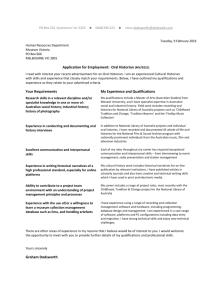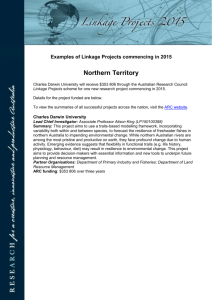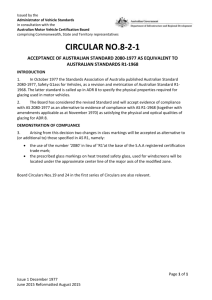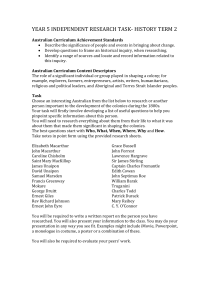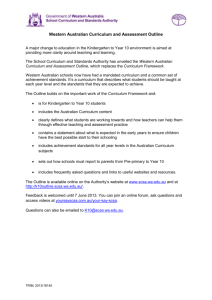CORE in Social, Cultural and Political Change: Profiles Professor
advertisement
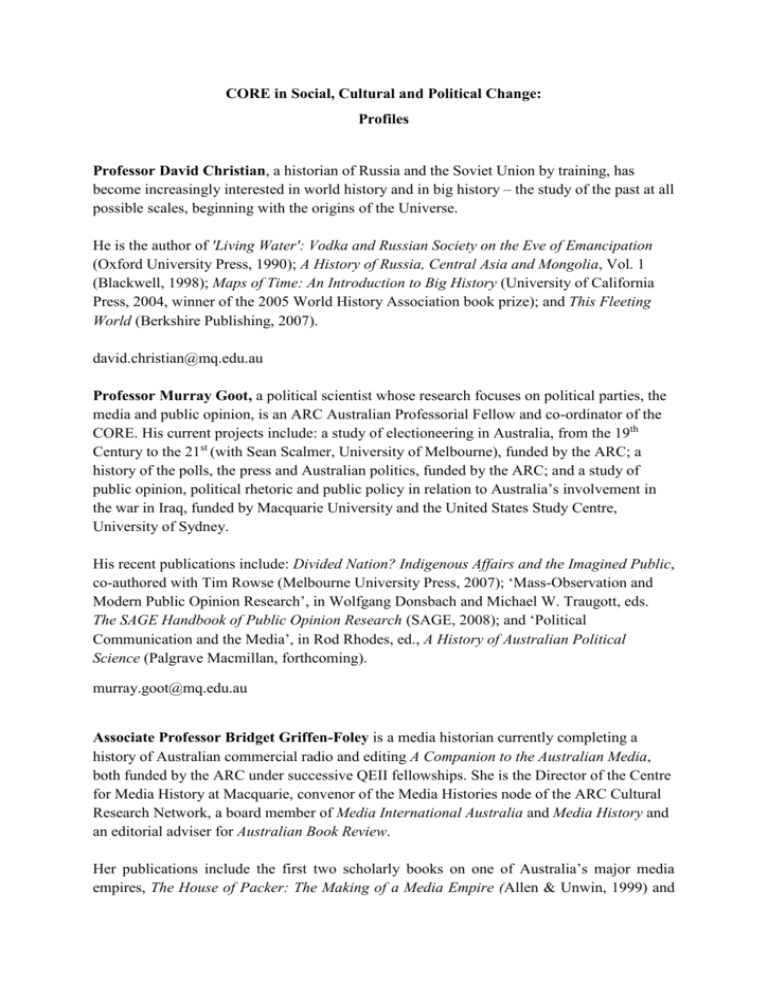
CORE in Social, Cultural and Political Change: Profiles Professor David Christian, a historian of Russia and the Soviet Union by training, has become increasingly interested in world history and in big history – the study of the past at all possible scales, beginning with the origins of the Universe. He is the author of 'Living Water': Vodka and Russian Society on the Eve of Emancipation (Oxford University Press, 1990); A History of Russia, Central Asia and Mongolia, Vol. 1 (Blackwell, 1998); Maps of Time: An Introduction to Big History (University of California Press, 2004, winner of the 2005 World History Association book prize); and This Fleeting World (Berkshire Publishing, 2007). david.christian@mq.edu.au Professor Murray Goot, a political scientist whose research focuses on political parties, the media and public opinion, is an ARC Australian Professorial Fellow and co-ordinator of the CORE. His current projects include: a study of electioneering in Australia, from the 19th Century to the 21st (with Sean Scalmer, University of Melbourne), funded by the ARC; a history of the polls, the press and Australian politics, funded by the ARC; and a study of public opinion, political rhetoric and public policy in relation to Australia’s involvement in the war in Iraq, funded by Macquarie University and the United States Study Centre, University of Sydney. His recent publications include: Divided Nation? Indigenous Affairs and the Imagined Public, co-authored with Tim Rowse (Melbourne University Press, 2007); ‘Mass-Observation and Modern Public Opinion Research’, in Wolfgang Donsbach and Michael W. Traugott, eds. The SAGE Handbook of Public Opinion Research (SAGE, 2008); and ‘Political Communication and the Media’, in Rod Rhodes, ed., A History of Australian Political Science (Palgrave Macmillan, forthcoming). murray.goot@mq.edu.au Associate Professor Bridget Griffen-Foley is a media historian currently completing a history of Australian commercial radio and editing A Companion to the Australian Media, both funded by the ARC under successive QEII fellowships. She is the Director of the Centre for Media History at Macquarie, convenor of the Media Histories node of the ARC Cultural Research Network, a board member of Media International Australia and Media History and an editorial adviser for Australian Book Review. Her publications include the first two scholarly books on one of Australia’s major media empires, The House of Packer: The Making of a Media Empire (Allen & Unwin, 1999) and Sir Frank Packer: The Young Master (HarperCollins, 2000), and Party Games: Australian Politicians and the Media from War to Dismissal (Text Publishing, 2003). bgfoley@humn.mq.edu.au Associate Professor Marnie Hughes-Warrington is a historiographer with a particular interest in historical films, the nature and purposes of historical debate and revision, and the changing social functions of world histories. Current projects include: an historical film reader for Routledge; the first volume of the Cambridge World History (co-edited with David Christian); and an ARC project on the connections between the social and political philosophies of New Idealists in Australia and Britain, and their contribution to federation and industrial, welfare and educational policies. She is the author of Fifty Key Thinkers on History (2000, second edition 2008) and 'How Good an Historian Shall I Be?': R. G. Collingwood, the Historical Imagination and Education (2003), History Goes to the Movies (2007), and the editor of Palgrave Advances in World Histories (2005). She serves on the editorial boards of the Journal of Global History, New Global Studies and World History Connected. mhughesw@humn.mq.edu.au Professor Stephanie Lawson has research interests that span political theory, area studies and international politics. Her research focuses on culture, ethnicity, nationalism, and democracy. She has particular expertise in the politics of Pacific Island states but has also written on Singapore, Malaysia and Japan. Current work includes: how, and under what circumstances, ‘context’ matters in the interpretation of politics; and the West/non-West dichotomy in the study of world politics. Her books include: Culture and Context in World Politics (Palgrave Macmillan, 2006); Europe and the Asia-Pacific: Culture, Identity and Representations of Region (RoutledgeCurzon, 2003); The New Agenda for International Relations: From Polarization to Globalization in World Politics? (Polity Press, 2002); and Tradition versus Democracy in the South Pacific: Fiji, Tonga and Western Samoa (Cambridge University Press, 1996; reprinted 2008). She is on the editorial boards of the Australian Journal of Political Science, Critical Asian Studies, Critical Review of International Social and Political Philosophy (CRISPP), European Journal of International Relations, International Studies Review, and Portal: Journal of Multidisciplinary International Studies. She is Regional Editor (Western Europe), Global Change, Peace and Security. And she is on the International Advisory Board of Nationalism and Ethnic Politics, and Nations and Nationalism. stephanie.lawson@mq.edu.au Associate Professor Robert Reynolds, who joins Macquarie in July 2009, is an Australian historian, specialising in histories of sexuality and emotional life. He has a keen interest in the constitution of individual and group identity in late modernity, using Australian gay life as a case study and oral history/life interviewing as a method. His current projects include an ARC funded history of the emotional impact of HIV/AIDS on Australian gay life, with a particular focus on the reverberation of individual and collective trauma over time, and an NHMRC funded study of GPs and the provision of HIV care . He is the author of From Camp to Queer: Remaking the Australian Homosexual (Melbourne University Press, 2002) and What Happened to Gay Life? (UNSW Press, 2007). He is also the co-editor (with Joy Damousi) of Histories on the Couch: Essays in History and Psychoanalysis (Melbourne University Press, 2003) and (with Gerard Sullivan) Gay Men’s Sexual Stories (Haworth Press, 2003). r.reynolds@unsw.edu.au Professor Mary Spongberg is a feminist and cultural historian. Her current projects include an ARC funded study of women's historical writing in Britain (with Clara Tuite, Melbourne University); a study of women's life writing in the late eighteenth century; and a gendered history of Early Modern Europe. She is editor of Australian Feminist Studies and principal editor of the Companion to Women's Historical Writing (Palgrave Macmillan, 2005). She has written two monographs: Women Writing History since the Renaissance (Palgrave Macmillan, 2002); and Feminising Venereal Disease (NYU Press, 1997), shortlisted for the NSW Premier's History Prize. mary.spongberg@mq.edu.au

